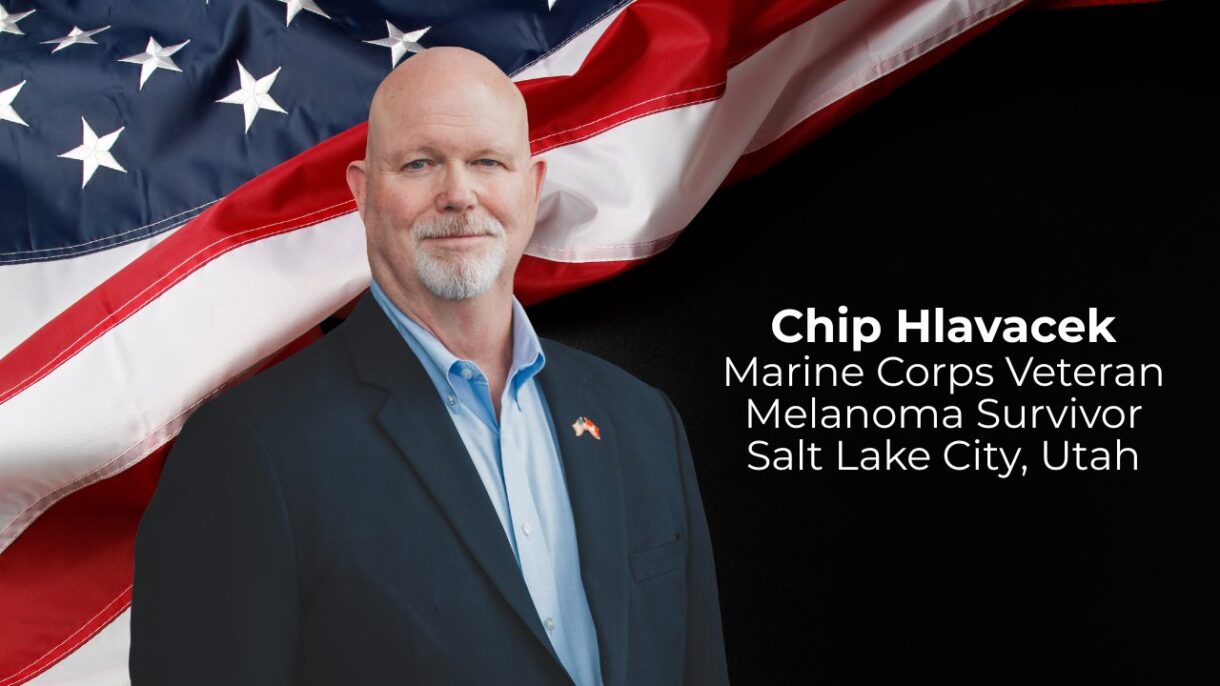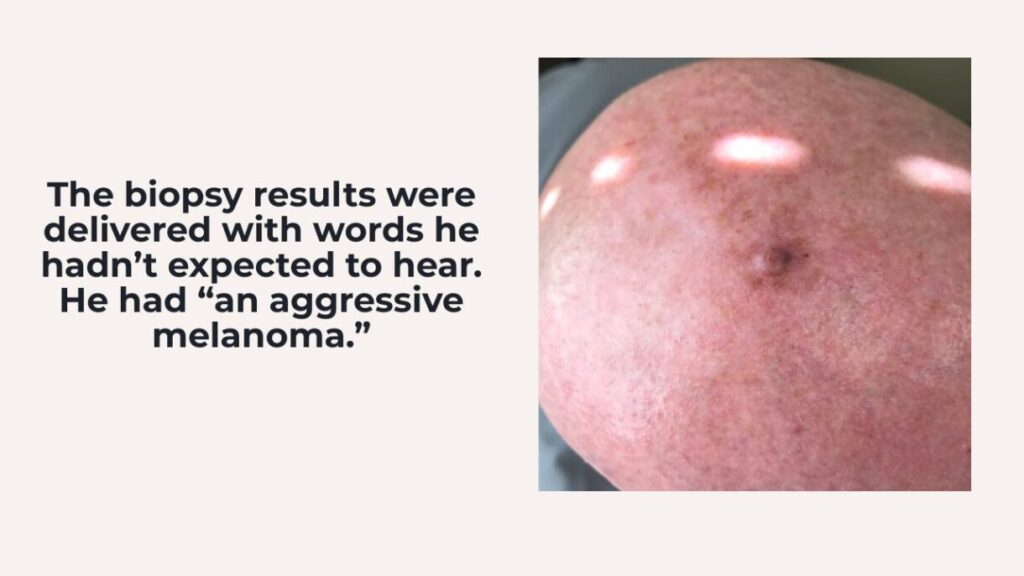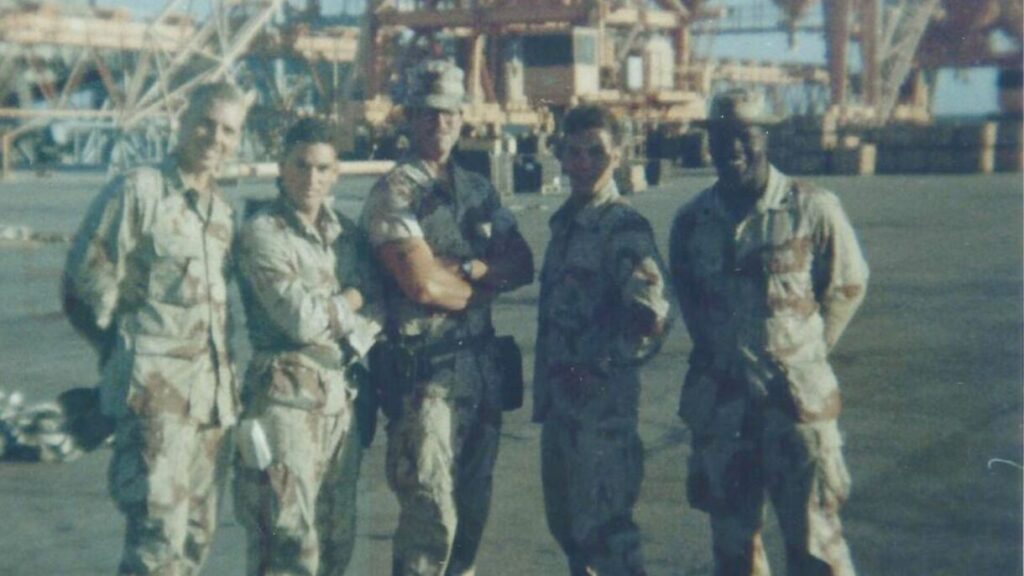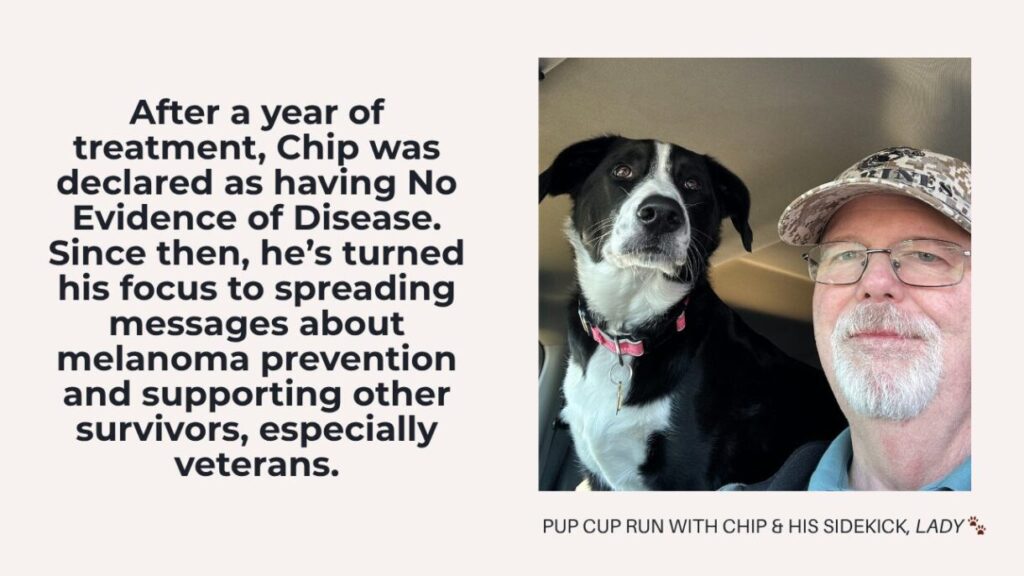Featured Survivor Story:
From Service to Survival: A Veteran’s Battle with Melanoma

by Mara Klecker
When a bump appeared on the top of his head in 2018, retired Marine Corps Chief Warrant Officer Chip Hlavacek didn’t think much of it. He nicknamed it his “unicorn horn” and went on with his life for several weeks. But at his wife’s urging, he finally went to a doctor to have it checked.
The biopsy results were delivered with words he hadn’t expected to hear. He had “an aggressive melanoma.”
I remember the doctor saying it over the phone, and it didn’t hit me right away,” Chip said. “Then I looked at my wife and saw the tears in her eyes. That’s when I knew it was serious.”
Doctors soon found out the melanoma had spread to Chip’s lymph nodes. Suddenly, the 65-year old Marine Corps veteran had to apply the mental and physical fortitude he learned in the military toward a battle against cancer.

During his two decades in the Marines, Chip served around the world, including 10 months on the ground in Operation Desert Shield/Storm. He remembers the black smoke from oil fires and the burn pits that smoldered near bases — but he didn’t realize then what the environmental hazards could mean for his health.
“We had no idea what we were breathing in,” he said.
It wasn’t until years later, when Congress passed the PACT Act in 2022, that the possible connection between his cancer and military service became clear. The law expanded VA health care and benefits for veterans exposed to toxins during deployments — from burn pits to oil fires — and added melanoma to the list of presumptive cancers.
Chip now encourages other veterans to explore their eligibility, especially those who served in the Middle East or near burn pits. His advice for those who may qualify is simple: Do your homework and stay organized to understand what paperwork you need to file.

For Chip, melanoma was what he calls a “speed bump” in his life. Throughout treatment, he was able to keep working his job supporting 911 centers across the globe, which requires frequent international travel. He credits that to his supportive family and workplace, as well as the lessons of discipline and resilience from the military.
“That training gave me the ability and the mental strength to keep going when it was getting a little tough and just keep fighting through it,” he said. “For the most part, melanoma never got me down.”
Chip said he remembers breaking down just once, when he learned he needed a second surgery to take more skin off his head.
“That was tough because there were so many unknowns at that point,” Chip said, recalling that he called his wife and cried.
Chip said a “top-notch” care team and his wife proved a crucial support system. After experiencing symptoms of thyroid complications – a side effect of pembrolizumab (Keytruda) – while in Dubai, Chip’s wife was waiting for him at the airport and took him straight to the doctor for blood tests.

“Life goes on,” he said, adding that he’s grateful that the side effects from his treatment weren’t more severe. Still, the infusions gave him rashes and left him so tired that he had to use a standing desk at work to keep himself from dozing off.
“You just learn to kind of muscle through it,” he said.
After a year of treatment, Chip was declared as having No Evidence of Disease. Since then, he’s turned his focus to spreading messages about melanoma prevention and supporting other survivors, especially veterans.
He has mentored a fellow veteran through Peer Connect, AIM at Melanoma’s mentorship program, and has served as emcee of AIM’s Steps Against Melanoma walk in Salt Lake City. This past year, that walk raised more than $12,000 for melanoma research, Chip said.
“I want to get the word out, especially to other vets who maybe don’t know about the PACT Act or other resources out there,” Chip said. He also said he’s not embarrassed to remind other bald men to wear sunscreen on their scalps to prevent skin cancer.
“If I can just help one other person, he said, “then it’s a win.”
Chip continues to give back by mentoring fellow survivors and raising awareness for melanoma prevention.
You can join him in making a difference:
- Support Research: Donations to the Salt Lake City Steps Against Melanoma Walk are still being accepted through the end of the year — every dollar helps fund research and support for those facing melanoma. Donate here.
- Connect with a Peer: If you or someone you love has been impacted by melanoma, learn more about Peer Connect, AIM’s free one-on-one support program for patients, survivors, and caregivers.
Recent Posts

Best-in-Class Real-World Data Support Early Amtagvi® Treatment in Advanced Melanoma

Moderna, Merck’s Skin Cancer Vaccine Shows Sustained Benefit in Five-Year Follow-Up

Reflecting on Melanoma Treatment in 2025 and Looking to the Future in 2026

The Integrative Care Approach


